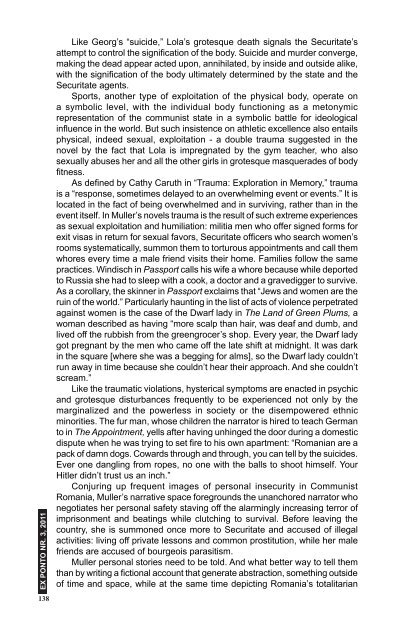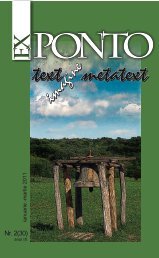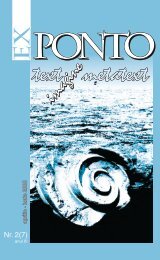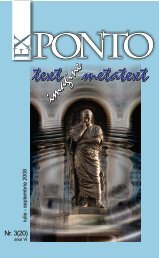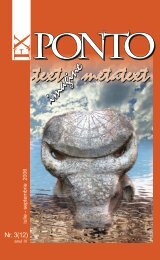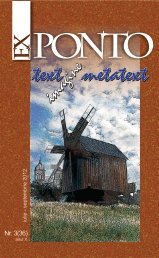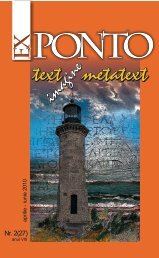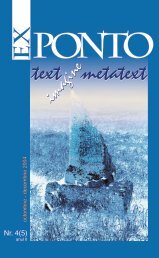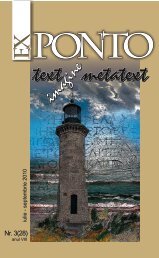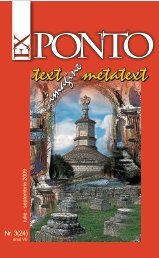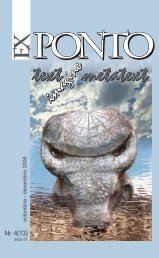Nr. 3 (32) anul IX / iulie-septembrie 2011 - ROMDIDAC
Nr. 3 (32) anul IX / iulie-septembrie 2011 - ROMDIDAC
Nr. 3 (32) anul IX / iulie-septembrie 2011 - ROMDIDAC
You also want an ePaper? Increase the reach of your titles
YUMPU automatically turns print PDFs into web optimized ePapers that Google loves.
Ex Ponto nr. 3, <strong>2011</strong><br />
Like Georg’s “suicide,” Lola’s grotesque death signals the Securitate’s<br />
attempt to control the signification of the body. Suicide and murder converge,<br />
making the dead appear acted upon, annihilated, by inside and outside alike,<br />
with the signification of the body ultimately determined by the state and the<br />
Securitate agents.<br />
Sports, another type of exploitation of the physical body, operate on<br />
a symbolic level, with the individual body functioning as a metonymic<br />
representation of the communist state in a symbolic battle for ideological<br />
influence in the world. But such insistence on athletic excellence also entails<br />
physical, indeed sexual, exploitation - a double trauma suggested in the<br />
novel by the fact that Lola is impregnated by the gym teacher, who also<br />
sexually abuses her and all the other girls in grotesque masquerades of body<br />
fitness.<br />
As defined by Cathy Caruth in “Trauma: Exploration in Memory,” trauma<br />
is a “response, sometimes delayed to an overwhelming event or events.” It is<br />
located in the fact of being overwhelmed and in surviving, rather than in the<br />
event itself. In Muller’s novels trauma is the result of such extreme experiences<br />
as sexual exploitation and humiliation: militia men who offer signed forms for<br />
exit visas in return for sexual favors, Securitate officers who search women’s<br />
rooms systematically, summon them to torturous appointments and call them<br />
whores every time a male friend visits their home. Families follow the same<br />
practices. Windisch in Passport calls his wife a whore because while deported<br />
to Russia she had to sleep with a cook, a doctor and a gravedigger to survive.<br />
As a corollary, the skinner in Passport exclaims that “Jews and women are the<br />
ruin of the world.” Particularly haunting in the list of acts of violence perpetrated<br />
against women is the case of the Dwarf lady in The Land of Green Plums, a<br />
woman described as having “more scalp than hair, was deaf and dumb, and<br />
lived off the rubbish from the greengrocer’s shop. Every year, the Dwarf lady<br />
got pregnant by the men who came off the late shift at midnight. It was dark<br />
in the square [where she was a begging for alms], so the Dwarf lady couldn’t<br />
run away in time because she couldn’t hear their approach. And she couldn’t<br />
scream.”<br />
Like the traumatic violations, hysterical symptoms are enacted in psychic<br />
and grotesque disturbances frequently to be experienced not only by the<br />
marginalized and the powerless in society or the disempowered ethnic<br />
minorities. The fur man, whose children the narrator is hired to teach German<br />
to in The Appointment, yells after having unhinged the door during a domestic<br />
dispute when he was trying to set fire to his own apartment: “Romanian are a<br />
pack of damn dogs. Cowards through and through, you can tell by the suicides.<br />
Ever one dangling from ropes, no one with the balls to shoot himself. Your<br />
Hitler didn’t trust us an inch.”<br />
Conjuring up frequent images of personal insecurity in Communist<br />
Romania, Muller’s narrative space foregrounds the unanchored narrator who<br />
negotiates her personal safety staving off the alarmingly increasing terror of<br />
imprisonment and beatings while clutching to survival. Before leaving the<br />
country, she is summoned once more to Securitate and accused of illegal<br />
activities: living off private lessons and common prostitution, while her male<br />
friends are accused of bourgeois parasitism.<br />
Muller personal stories need to be told. And what better way to tell them<br />
than by writing a fictional account that generate abstraction, something outside<br />
of time and space, while at the same time depicting Romania’s totalitarian<br />
138


